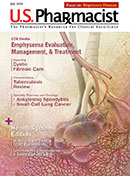Pomalidomide and dexamethasone is the standard of care for relapsed multiple myeloma in patients who have failed bortezomib and lenolidamide. The KEYNOTE-183 study investigated pembrolizumab plus pomalidomide and dexamethasone in patients with relapsed or refractory multiple myeloma.
In the past few years, multiple treatment options have become available for relapsed multiple myeloma; however, a role for immunotherapy is still being established, and this study, funded by Merck (the maker of pembrolizumab), is a stepping-stone. This randomized, phase 3 trial examined the safety and efficacy of pomalidomide and dexamethasone with or without pembrolizumab in patients with relapsed or refractory multiple myeloma. This trial was conducted at 97 medical centers in 11 countries (Germany, Australia, Canada, France, Norway, Israel, Italy, Japan, Spain, United States, and New Zealand). Inclusion criteria stated that patients had to be at least 18 years old with a diagnosis of relapsed multiple myeloma, have an Eastern Cooperative Oncology Group (ECOG) performance status of 0 or 1, and be previously treated with two lines of therapy.
Patients were randomized in a 1:1 ratio to either pembrolizumab plus pomalidomide and dexamethasone or pomalidomide and dexamethasone. Patients received pomalidomide 4 mg daily on Days 1, 8, 15, and 22 in a 28-day cycle with oral low-dose dexamethasone 40 mg with or without pembrolizumab 200 mg every 3 weeks. The primary endpoints were progression-free survival and overall survival. The study was conducted between January 18, 2016, and June 7, 2017, in a total of 249 patients. The study ended early on July 3, 2017, because the FDA established that risks were associated with the triple combination and that they outweighed the benefits. Median follow-up was about 8.1 months with a progression-free survival of 5.6 months (95% CI 3.7-7.5) in the pembrolizumab-plus-pomalidomide-and-dexamethasone group versus 8.4 months in the pomalidomide-and-dexamethasone group.
Median overall survival was not reached, but overall survival estimates at 6 months were 82% in the pembrolizumab group versus 90% in the group without pembrolizumab. Serious adverse events occurred in 63% of patients in the pembrolizumab group versus 46% in the group without pembrolizumab, including neutropenic sepsis, myocarditis, and Stevens-Johnson syndrome. Treatment-related deaths occurred only in the pembrolizumab group; there were none in the group not receiving pembrolizumab. Immunotherapy is generally better tolerated than chemotherapy; however, combining it with other agents was shown to have a greater risk of side effects.
These results show that the benefit-versus-risk profile of pembrolizumab plus pomalidomide and dexamethasone is unfavorable in patients with relapsed multiple myeloma. Future studies should focus on establishing a better role for pembrolizumab in the relapsed multiple myeloma setting. Immunotherapy has revolutionized oncology treatment for many different cancer types, and its role in refractory or relapsed multiple myeloma is on the horizon. Although results of this study were disappointing, future studies may show otherwise.
« Click here to return to Hematology & Oncology Update.
Published November 25, 2019






